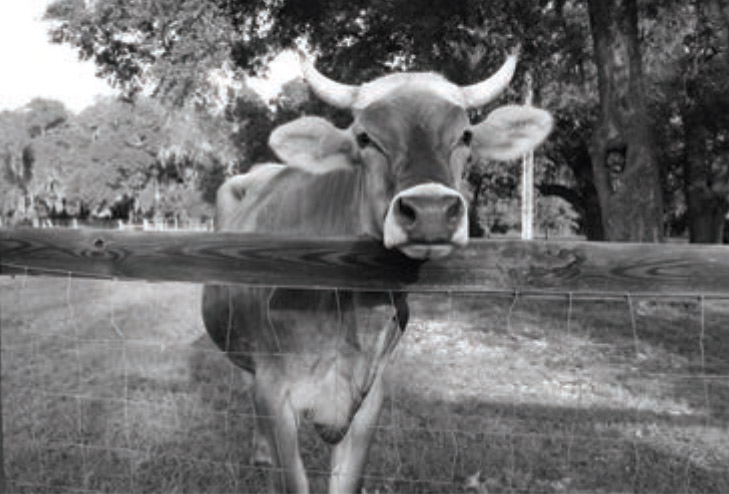
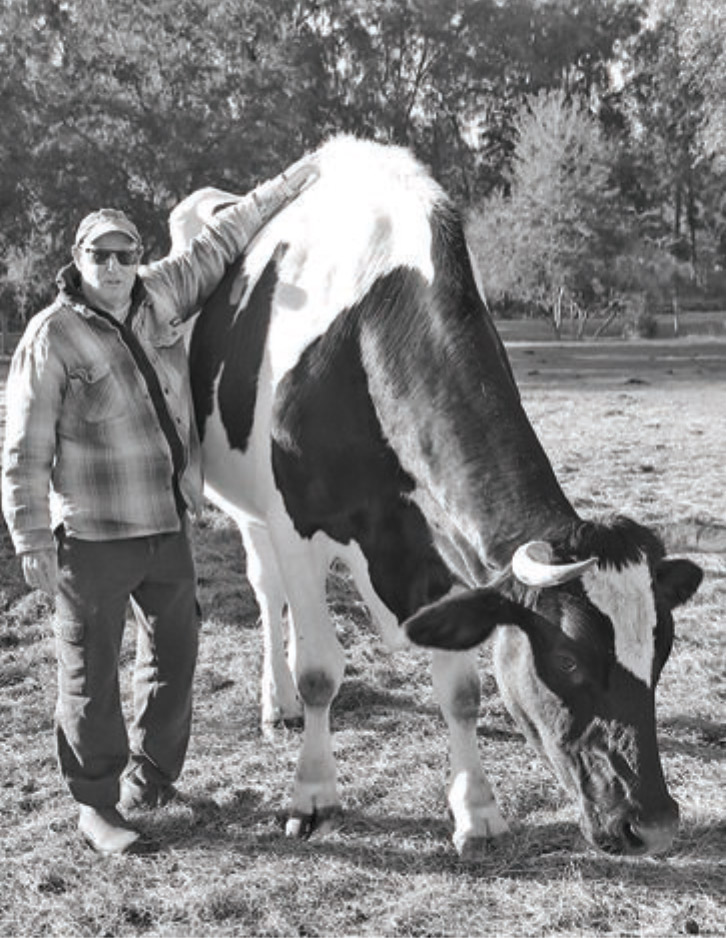
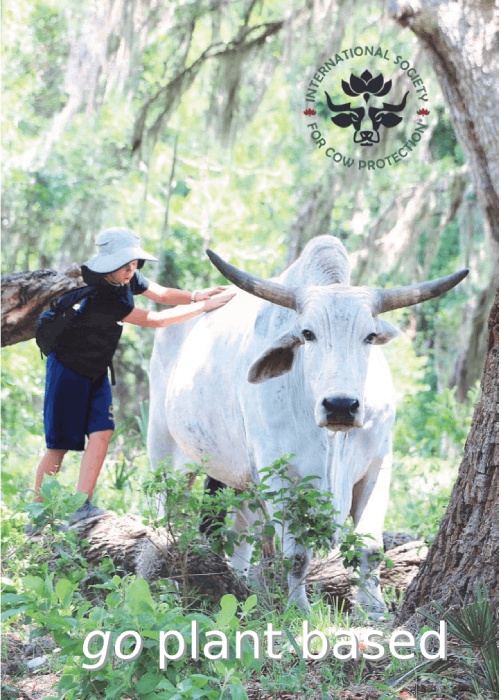
International Society for Cow Protection

Keshava is a 14 year old ox living far from the slaughterhouse at the ISCOWP sanctuary
ISCOWP Profile
The International Society for Cow Protection, Inc. (ISCOWP) was incorporated in the USA, March 1990, as a 501 (c) (3) non-profit, tax exempt organization. William and Irene Dove (Balabhadra das and Chayadevi dasi) are its founders. They are disciples of His Divine Grace A.C. Bhaktivedanta Swami Prabhupada, the Founder Acharya of the International Society for Krishna Consciousness (ISKCON). Through their spiritual master’s teachings, they have imbibed the practices and benefits, both spiritual and material, of lifetime cow protection. Cow protection means enabling cows to live out their natural lives with love and affection. The tenets of cow protection are universal and nonsectarian, available to all regardless of race, creed, or nationality.
Mailing Address
ISCOWP
7016 SE 92 Terrace
Gainesville FL, USA, 32641
Phone 352.792.6777
Donations and Financial Reports
USA tax deductible number:23-2604082. A copy of each year’s ISCOWP IRS Form 990-EZ is available at guidestar.org
To donate
iscowp.org/donations
Address check to ISCOWP and send to ISCOWP mailing address
E-newsletter Monthly
Subscribe on our website, iscowp.org/subscribe
Store
iscowp.org/store
Adopt A Cow
iscowp.org/adopt-a-cow
Internet
[email protected]
iscowp.org
youtube.com/user/ISCOWP108
internationalsocietyforcowprotectioniscowp
www.instagram.com/iscowp
Dear Friends,
We believe rescuing cows from slaughter and then caring for them their entire lives (a cow can live for 25 years or more) until their natural death is a humane, compassionate act and can only help the planet towards a more peaceful existence.
Besides maintaining our local sanctuary, we encourage and educate others on how they, too, can care for cows. William E. Dove, ISCOWP president, has traveled widely to counsel future and current cow protection programs. We also offer assistance through conference calls, seminars, and literature.
Compared to the numbers of cows bred daily worldwide, what we are doing, both locally and beyond, is less than a mere drop in the bucket. Therefore we encourage people to change their diet to a plant-based one. Not only do we encourage eliminating meat from one’s diet, but we also encourage eliminating, or at least decreasing milk (and its byproducts). Diet change alone can make a significant difference in the number of cows bred and tortured each day to put meat, milk, and its byproducts on the dinner table. When there is less demand, there will be less supply. The result is less suffering for Mother Cow.
This booklet gives much information on how your diet change will affect your health, environment, and the lives of so many animals. Sources like Down to Earth, NPR, New York Times, Science, United Nations, and the Vedic literature are quoted.
Your Editor, Irene M. Dove (Chayadevi)
In an article of the magazine’s special edition The World in 2019, The Economist’correspondent John Parker declared 2019 the “year of the Vegan.”
According to Parker, interest in veganism is soring, especially among millennials, with “fully a quarter of 25 – to 34-year-old Americans declaring to be vegans or vegetarians.” Forbes.com
For years, registered dietitians and food scientists alike have touted the perks of eating plants and cutting back on meat. And it seems people are catching on. A study published in The Permanente Journal in the summer of 2016 notes that plant-based diets have gone mainstream — partly because the advantages have been well researched and healthcare practitioners recommend this way of eating as many have seen incredible results from their patients.
High blood pressure, or hypertension, can increase the risk for health issues, including heart disease, stroke, and type 2 diabetes, according to the Physicians Committee for Responsible Medicine. (2) Luckily, the foods you eat can make a difference. Several studies have shown that sticking with a plant-based diet can reduce blood pressure, thereby reducing your risk for those conditions. A meta-analysis published in April 2014 in JAMA Internal Medicine explored data from 39 studies and concluded that people who followed a vegetarian diet had lower blood pressure on average than those who followed omnivorous diets, meaning those including plants and meat. (3) And another study published in November 2016 in the Journal of Hypertension found that vegetarians had a 34 percent lower risk of developing hypertension than nonvegetarians. (4
Meat contains saturated fat, which can contribute to heart issues when eaten in excess. So by cutting back on meat and loading up on plant-based foods, you’re doing your ticker a favor. (5) A study published in August 2019 in the Journal of the American Heart Association found that eating a plant-based diet may reduce the risk of developing cardiovascular disease by 16 percent and dying of this health condition by about 31 percent. (6) That means loading up on whole grains, legumes, fruits, vegetables, and healthy oils (such as olive oil) rather than unhealthy plant foods, like refined grains and sugary beverages, which can increase your risk of heart trouble, according to a study published in July 2017 in the Journal of the American College of Cardiology. (7)
It’s well known that there’s a link between diet and type 2 diabetes. Weight is a major risk factor since more fatty tissue makes the cells more resistant to insulin, according to the Mayo Clinic. (8) But which type of diet is best to avoid type 2 diabetes? Studies suggest that a plant-based one has benefits. A study published in June 2016 in PLoS Medicine found that eating a plant-based diet filled with high-quality plant foods reduced the risk of developing type 2 diabetes by 34 percent. (9) It’s likely because plants are lower in saturated fats than animal foods, which raises cholesterol levels and your risk of developing type 2 diabetes, notes the American Diabetes Association. (10) Another study published in Diabetes Care found the prevalence of type 2 diabetes was 7.6 percent among nonvegetarians and only 2.9 percent for vegans. (11)
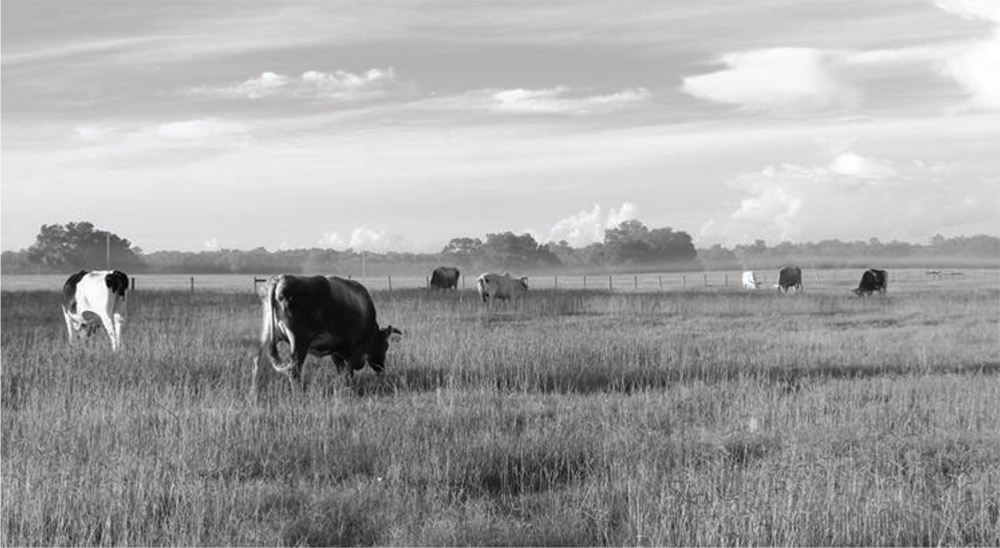
Your risk of obesity decreases when you swap a meat-heavy diet for a plant-based one. In short: Plant eaters tend to weigh less, even if that’s not always the No. 1 goal. The aforementioned Diabetes Care study found substantial body mass index (BMI) differences between non-meat eaters and meat eaters. (11) The mean BMI for vegans was 23.6, while for nonvegetarians, it was 28.8, which qualifies as overweight, according to the National Heart, Lung, and Blood Institute. (11,12)
Eating more plants can help you drop pounds, too. According to a small study published in March 2017 in Nutrition & Diabetes, 65 overweight adults who followed a whole-food, plant-based diet for one year lost 9.25 pounds on average. (13) One reason for the weight loss is that whole grains and vegetables are relatively low on the glycemic index — which means they’re digested more slowly — and fruit contains antioxidants and fiber, which helps prolong fullness, according to data cited in a study published in January 2016 in the Journal of General Internal Medicine. (14)
All of the other potential benefits listed here roll into one major one: living longer. The Journal of the American Heart Association study found that a plant-based diet lowers the risk of all causes of mortality by 25 percent. (6) And beyond that, the protective levels increase if you stick with healthy plant-based foods. A study published in April 2018 in The Journal of Nutrition found that eating healthy plant foods versus unhealthy ones extends that protection layer by another 5 percent
High cholesterol can lead to fatty deposits in the blood, which can restrict blood flow and potentially lead to heart attack, stroke, or heart disease. (18) But a healthy diet can help keep cholesterol levels in check. Specifically, moving away from a diet filled with animal products toward one that’s primarily plant based can lower LDL (“bad”) cholesterol by between 10 and 15 percent, while those following a strict vegan diet can lower their LDL cholesterol by as much as 25 percent, according to a review of 27 studies published in The American Journal of Cardiology. (19)
Your risk for stroke increases if you have high blood pressure, are overweight, have diabetes or heart disease, have high cholesterol, or smoke, drink, or use drugs. (20) As noted above, most of those risk factors can be wiped out by following a plant-based diet and making healthy lifestyle choices. After all, half of strokes are preventable. (20) One simple way to reduce your risk is by increasing your intake of fruits and vegetables. The highest consumers of fruits and veggies had a 21 percent lower risk of stroke than those who consumed the least, according to a study published in June 2014 in Stroke. (21)
The physiological benefits of following a plant-based diet are many, but there are some possible mental ones, too. “There is some compelling research examining plant-based diets and their role in slowing the progression of Alzheimer’s,” Mary Feller, RD, CDN, a dietitian and the author of The Southern Comfort Food Diabetes Cookbook says. A review of nine studies, published in 2017 in Frontiers in Aging Neuroscience, found that eating an extra 100 grams of fruits and vegetables per day (about one-half cup) led to a 13 percent reduction in the risk of cognitive impairment and dementia. (22) The likely reason: Fruits and vegetables are rich in polyphenols, which an article published in August 2018 in Nutrients notes are in fruits, vegetables, and whole grains (aka, the cornerstones of a plant-based diet). Polyphenols may help slow the progression of Alzheimer’s disease and may help reverse cognitive decline, according to a review published in 2014 in Current Pharmaceutical Biotechnology. . (23)
9 Scientific Benefits of Following a PlantBased Diet from the website Everyday Health by Moira Lawler. Medically Reviewed by Kelly Kennedy, RD. Last Updated: January 17, 2020. Footnotes and some topics are linked to their sources on the website.
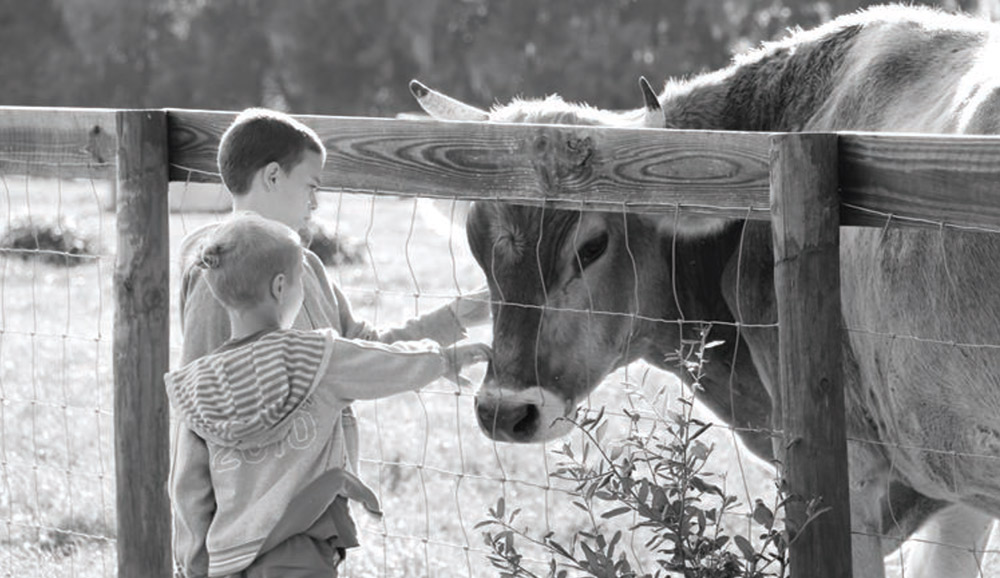
What I Eat Affects Climate Change ?
Yes. The world’s food system is responsible for about one-quarter of the planet-warming greenhouse gases that humans generate each year. That includes raising and harvesting all the plants, animals and animal products we eat — beef, chicken, fish, milk, lentils, kale, corn and more — as well as processing, packaging and shipping food to markets all over the world. If you eat food, you’re part of this system.
How Exactly Does Food Contribute to Global Warming?
Lots of ways. Here are four of the biggest: When forests are cleared to make room for farms and livestock — this happens on a daily basis in some parts of the world — large stores of carbon are released into the atmosphere, which heats up the planet. When cows, sheep and goats digest their food, they burp up methane, another potent greenhouse gas contributing to climate change. Animal manure and rice paddies are also big methane sources. Finally, fossil fuels are used to operate farm machinery, make fertilizer and ship food around the globe, all of which generate emissions.
Which Foods Have the Largest Impact ?
Meat and dairy, particularly from cows, have an outsize impact, with livestock accounting for around 14.5 percent of the world’s greenhouse gases each year. That’s roughly the same amount as the emissions from all the cars, trucks, airplanes and ships combined in the world today. In general, beef and lamb have the biggest climate footprint per gram of protein, while plant-based foods tend to have the smallest impact. Pork and chicken are somewhere in the middle. A major study published last year in the journal Science calculated the average greenhouse gas emissions associated with different foods. The average greenhouse gas impact (in kilograms of CO2) of getting 50 grams of protein from: Beef = 17.7, lamb = 9.9, farmed crustaceans = 9.1, cheese = 5.4, pork = 3.8, farmed fish = 3.0, poultry = 2.9, eggs = 2.1, tofu = 1.0, beans = 0.4, and nuts = 0.1. Poore and Nemecek, Science
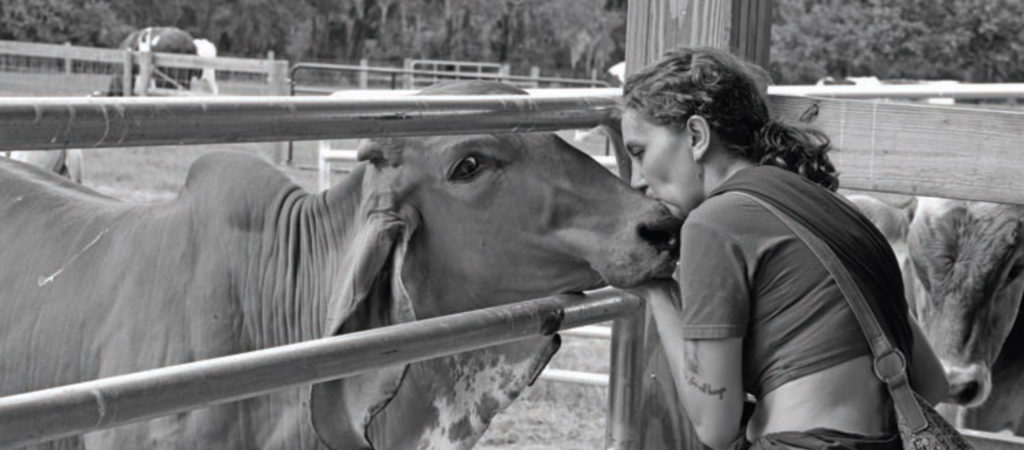
Why Meat Has a Big Climate Impact?
Think about it this way: It’s often more efficient to grow crops for humans to eat than it is to grow crops for animals to eat and then turn those animals into food for humans. One recent study by the United Nations Food and Agriculture Organization concluded that, on average, it takes about three pounds of grain to raise one pound of meat.
In general, it takes more land, energy and water to produce a pound of animal protein than it does to produce a pound of plant protein. Beef and lamb have an especially large climate footprint for another reason: The stomachs of cows and sheep contain bacteria that help them digest grass and other foods. But those bacteria create methane, a potent greenhouse gas, that is then released through burps (and a bit of flatulence).
What About Grass Fed Beef ?
In the United States, most cattle spend their first year on pastures eating grass, after which they are typically moved to a feedlot, where they are fattened up with grain. By contrast, “grass-fed” or “grassfinished” cattle keep grazing on grass until they are slaughtered.
Some scientists have suggested that grassfinished beef, if managed properly, can be a more sustainable option: As the cattle graze, they stimulate grass to grow deep roots and pull more carbon into the soil, helping to offset the cows’ climate impact. But, on the flip side, grass-finished cattle also take longer to reach slaughter weight, which means they spend more time burping up methane into the atmosphere. Because of this, some studies have suggested that grass-fed beef can actually be worse for the climate over all, though the debate about this continues to rage. For now, it’s hard to say with confidence that grass-fed beef is consistently more climate-friendly than conventional beef.
How Much Impact Do Milk and Cheese Have on Climate Change?
A number of studies have found that milk typically has a smaller climate footprint than chicken, eggs or pork per pound. Yogurt, cottage cheese and cream cheese are similar to milk. But many other types of cheese, such as Cheddar or mozzarella, can have a significantly bigger footprint than chicken or pork, since it typically takes about 10 pounds of milk to make one pound of cheese.


Changing My Diet Will Help?
It varies from person to person. But a number of studies have concluded that people who currently eat a meat-heavy diet — including much of the population of the United States and Europe — could shrink their food-related footprint by onethird or more by moving to a vegetarian diet. Giving up dairy would reduce those emissions even further.
Climate-Friendlier Diets
The average drop in food-related emissions when people switch from a typical Western diet to lower-impact ones: vegan, about –45%, vegetarian, about –30%, partially replace meat and dairy with plants, about -30%, replace beef and lamb with other meat, about –20%.: Aleksandrowicz et al, PLoS One
Your Questions About Food and Climate Change, Answered. By Julia Moskin, Brad Plumer, Rebecca Lieberman and Eden Weingart, April 30, 2019, nytimes.com. Many linked references.
According to the 2019 UN Climate Change Report: Food and Land, one answer to the climate crisis is on our plates. The findings: Land use — specifically how we grow, get and eat our food — is a major driver of climate change
The Dairy Reality
Dairy cows are repeatedly impregnated by artificial insemination and have their newborns taken away at birth. Female calves are confined to individual pens and have their horn buds destroyed when they are about eight weeks old. The males are not so lucky. Soon after birth, they are trucked off to veal farms or cattle ranches where they end up as hamburger meat. The typical dairy cow in the United States will spend its entire life inside a concretefloored enclosure, and although they can live 20 years, most are sent to slaughter after four or five years when their milk production wanes.
“People have this image of Old MacDonald’s farm, with happy cows living on green pastures, but that’s just so far from reality,” said Erica Meier, the president of the activist organization Animal Outlook. “Some farms might be less cruel than others, but there is no such thing as cruelty-free milk.” Is Dairy Farming Cruel to Cows? By Andrew Jacobs, Dec. 29, 2020, nytimes.com
At the ISCOWP sanctuary, we have three cows rescued from the dairy industry, Vegan Indira, Madhavi, and Kalindi. It has been a few years since we rescued them, and we have had time to observe how being in the dairy has affected their personalities and made them different from the other cows who were rescued early in life. We read a lot about how the dairy industry horrifically treats cows. Knowing a dairy cow survivor is a strong impetus to consider eliminating commercial dairy from one’s diet.
In 2011, we received a letter from Judy who worked at the dairy, “My favorite cow on the herd that I milk is due to be culled (slaughtered), probably sometime this month. She didn’t breed back, and the farmer has been “milking her down” until she reaches the point she’s no longer profitable, then it’s buh-bye! She has been milked for almost 2 years running now, so it’s getting close. She’s in her 3rd lactation now, about 6 years old, and has given 95,000 pounds of milk, something like 11,000 gallons! Truly a mind-boggling amount when you think about it. I think she deserves a nice retirement. I think she’s just getting worn out from being milked for so long without a break! Her feet aren’t the greatest — she isn’t lame right now, and she’ll probably be even better when she’s not standing on concrete 24/7. She has a nice personality, likes people, isn’t flighty, holds her own in the herd but isn’t dominant or pushy or a bully to the other cows. One of the old girls who stands in the back of the holding pen and patiently waits her turn. Just a nice cow.”
From Judy’s letter, we can calculate Madhavi had three children taken from her by the time ISCOWP members rescued her. She has remained a quiet, reserved cow keeping a lot to herself except for her friends Vegan Indira and Kalindi Vijaya rescued from the same dairy. In many ways, she is a bit sullen Losing her children while in the dairy has negatively affected her personality. Also, the dairy cut off her tail. Some dairies believe the tail is dirty and gets in the way of milking. However, after ten years living at the ISCOWP sanctuary, Madhavi was seen affectionately licking Madhava, one of the elder oxen.
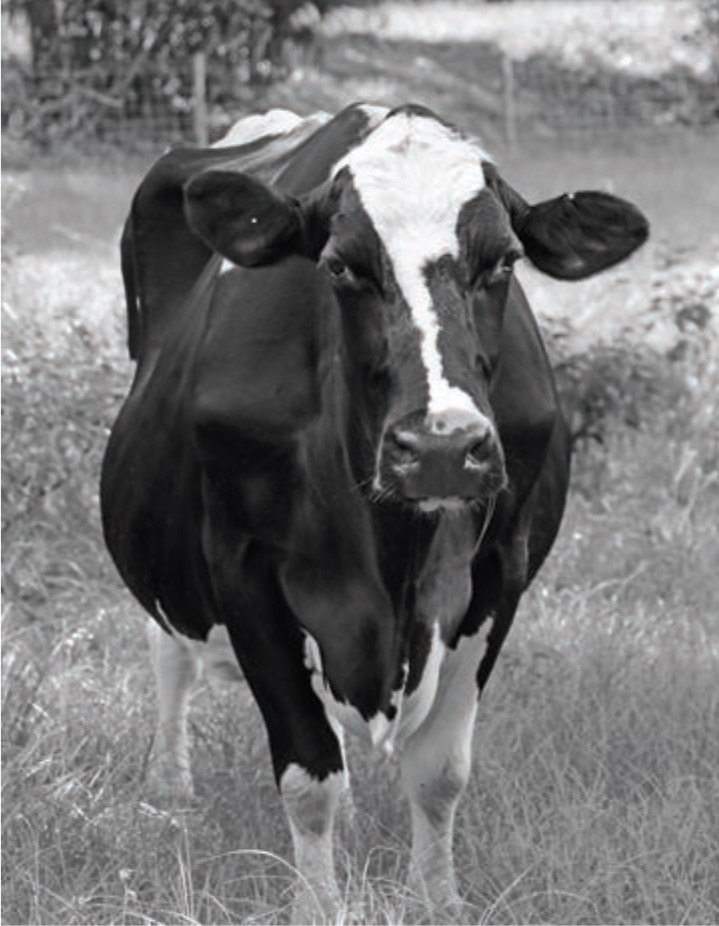
We often wonder what goes on in her head. Does she lament her missing children? Of the three cows rescued from the dairy, she lived the longest at the dairy, and she is the most reserved, the most withdrawn
Thoughts to Ponder: Does Being Vegan Really Help Animals?
More people are moving toward a plant based diet, owning in part to evidence about human health and environmental sustainability, and in part to the emerging scientific consensus on the Madhavi, rescued from the dairy in 2011. breadth and depth of animal consciousness and sentience.
But how might choosing to eat fewer animals than ever before — or no animals at all (vegetarian), or no animals or animal products (vegan) — make a difference for animals or for the world?
I decided to pose a few questions, by email, earlier this week to three animal activists and vegans: Paul Shapiro of the Humane Society of the United States, Bruce Friedrich of Farm Sanctuary, and Alka Chandna of PETA. Here’s the first:
Do you find it personally motivating or inspiring to reflect upon the number of animals who live each year, who otherwise would not, because you are vegan?
Paul: Eating fewer or no animals doesn’t mean that animals who would’ve been killed will now live; it means that animals who would’ve been bred into existence to suffer on factory farms will now not be brought into the world and exploited in the terrible ways that are customary in the meat industry. It’s a supply and demand issue. Less demand should mean less supply.
Bruce: As Paul notes, by removing our demand, we’re sparing animals suffering that is beyond our worst imaginings. I do find it deeply motivating to realize that I can live my values every time I sit down to eat. St. Paul called on the faithful to pray ceaselessly. I like that every time I sit down to eat, I cast my lot for mercy, and against misery — for compassion, and against cruelty. Every meal becomes a prayer for a kinder and more just world.
Alka: I don’t think so much about the numbers of animals who are spared as much as I think about the misery and suffering that I’m not contributing to as a result of my choices. It was learning about the horrific conditions on factory farms — and thinking about the arbitrary cultural lines that determine which animals are eaten and which are spared — that compelled me to adopt a vegan diet; and I feel some comfort in knowing that my actions are not contributing to, or paying for those systems to carry out, their business.
Conversely, if I am accidentally served something that isn’t vegan at a restaurant (and I know the dish is going to be thrown away), I feel like I have contributed to the torment suffered by the animals whose flesh or bodily products were in the dish. For example, if I’m given something that contains an egg, I think that my miscommunication resulted in a hen suffering in a battery cage for 34 hours (and all of the ancillary suffering inherent in the discarding of the male chicks, the eventual slaughter, and so on). It’s [weighing] the time that an animal suffered on a factory farm for that item to come into existence, balanced against the few minutes of enjoyment I might derive from eating that item.
This convergence in Paul, Bruce and Alka’s answers underscores the view that animal rescue is not as much about filling up sanctuaries with animals saved from slaughter, as it is approaching our entire food system with fresh eyes. npr.org; “Does Being Vegan Really Help Animals.” (See also Philip Lymbery’s book Farmageddon: The True Cost of Cheap Meat).
According to the popular vegan calculator online, everyday a vegan saves 1 animal life, 1,100 gallons of water, 40 lbs. of grain, 30 ft2 of forested land, and 20 lbs. of CO2
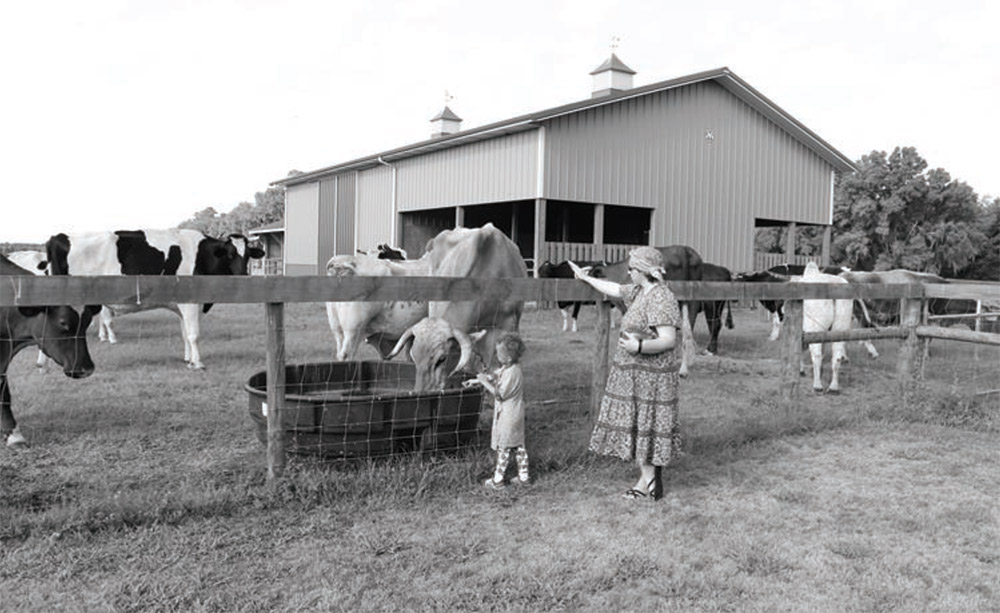
The Golden Rule, “Do unto others as you would have others do onto you,” Is one of the uniting principles in the world’s major religious traditions. In Judaism, it is taught, “What is hateful to you, do not to your fellowmen.” — Talmud, Shabbat 31a Christianity teaches, “Whatever ye would that men should do to you, do you even so to them.” — Matthew 7:12. The followers of Islam declare, “No one of you is a believer until he desires for his brother that which he desires for himself.” — Sunnah, Hadith. In Confucianism it is said, “Surely it is the maxim of loving kindness: Do not unto others that which you would not have them do unto you.” — Analects 15.23. Buddhism also teaches, “Hurt not others in ways that you yourself would find hurtful.” — Udana-Varga 5.18. And finally, in the world’s earliest religious scriptures, the Vedic literature, we find, “This is the sum of duty: Do naught unto others which would cause you pain if done unto you.” — Mahabharata 5.1517.
The world of science echoes the world’s religions with its own equivalent of the Golden Rule. Newton’s Third Law of Motion says “For every action, there is an equal and opposite reaction.” While Newton’s law applies only to material nature, the implications run deeper still, extending to the most subtle levels of existence. In the East, this is called the law of Karma.
In a very fundamental sense, too, this law relates to our treatment of animals. The violence in society is at least in part the result of our merciless diet and abuse of the natural world around us. In karmic terms, violence begets violence. In dietary terms, you are what you eat.”– Food for the Spirit, Steven Rosen
“Srila Prabhupada: […] But in the western country the cows are specially being killed. Now the reaction is war, crime, and they are now repentant. And they will have to repent more and more. Jayatirtha: So the wars and the crime are a direct result of the cow slaughter. Prabhupada: Oh, yes. Oh, yes. It is a wholesale reaction. All these crises are taking place.[…]” — from talk with writer and Sri (Brahman ox) and Balaji are great friends. They are on the front cover together.
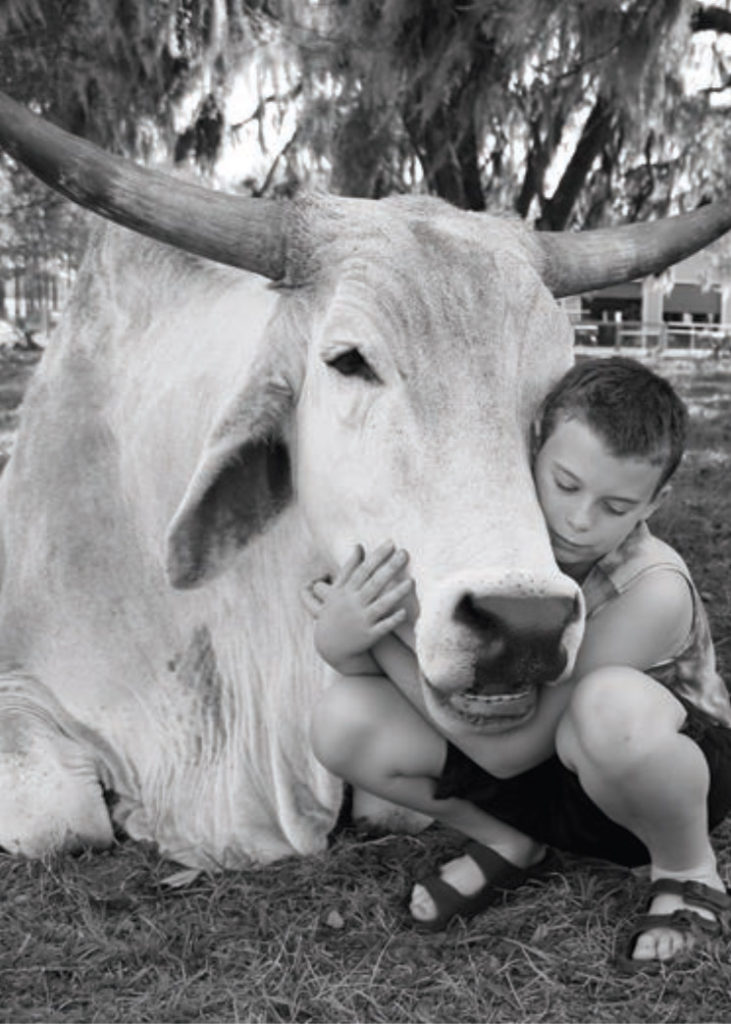
editing manager of Playboy Magazine and Srila Prabhupada, July 5, 1975, Chicago We are living in precarious times. An age referred to as Kali-yuga, with a duration lasting close to 430,000 years. Kali-yuga is a troubled age characterized by chaos, quarrel, materialistic advancement, and is also called The Iron Age. There is a great deal of suffering by the human population as well as the innocent animals in all categories due to the exploitive mentality of the humans.
“The next symptom of the age of Kali is the distressed condition of the cow…. But in the Kali-yuga, the cow’s calves are separated from the cows as early as possible for purposes which may not be mentioned in these pages of Srimad Bhagavatam…. People do not know what they are doing in the name of economic development. The influence of Kali will keep them in the darkness of ignorance.” In the Srimad Bhagavatam Canto 1 Chapter 17 text 3, Partial purport by His Divine Grace A.C. Bhaktivedanta Swami Prabhupada:
As of this writing, this particular Kali-yuga has been progressing for about 5,000 years, and the treatment of the cows and bulls is horrendous at best, with millions of cows, bulls, and calves being murdered daily to satisfy the bloodlust of the human population of the Earth planet. The soil of Mother Earth is saturated with the blood of the cows, bulls, and calves. It has been brought to our attention in the Srimad Bhagavatam Canto 1 chapter 16 text 18 who the cow and bull represent; “The personality of religious principles, Dharma, was wandering in the form of a bull. And he met the personality of earth in the form of a cow who appeared to grieve like a mother who had lost her child. She had tears in her eyes and the beauty of her body was lost.”
The earth planet needs help to squelch the horrific treatment of the cows, bulls, and calves. As long as the Bovine family is being murdered, then society will continue to be plagued by millions of violent deaths in the human strata of society to pay back the karma accumulated by the activities of the slaughterhouses. It is said that for killing a cow, the karma for these horrific sinful acts is that for each hair on that cow’s back the people involved in that murder will have to suffer another birth and violent death. It is not just the butcher who will reap this karma. The karma starts with the person who is raising the cow with the intention of killing her. From that person all the way up to the butcher who kills the cow and the truck driver who delivers the meat to the market or restaurant and cashier who rings up the sale.
There are many reasons to lesson or eliminate meat, milk, and milk products from one’s diet. To call oneself a spiritual being is hypocritical if one continues to consume foods that are dependent on the suffering of animals to reach your dinner plate. Please reduce your meat and dairy intake and add more fruits, vegetables, nuts, seeds, oils, whole grains, legumes, and beans for the sake of your health, the environment, and the lives of all the innocent animals. You can also donate and volunteer at animal sanctuaries where a few lucky souls in animal bodies will live a peaceful life.
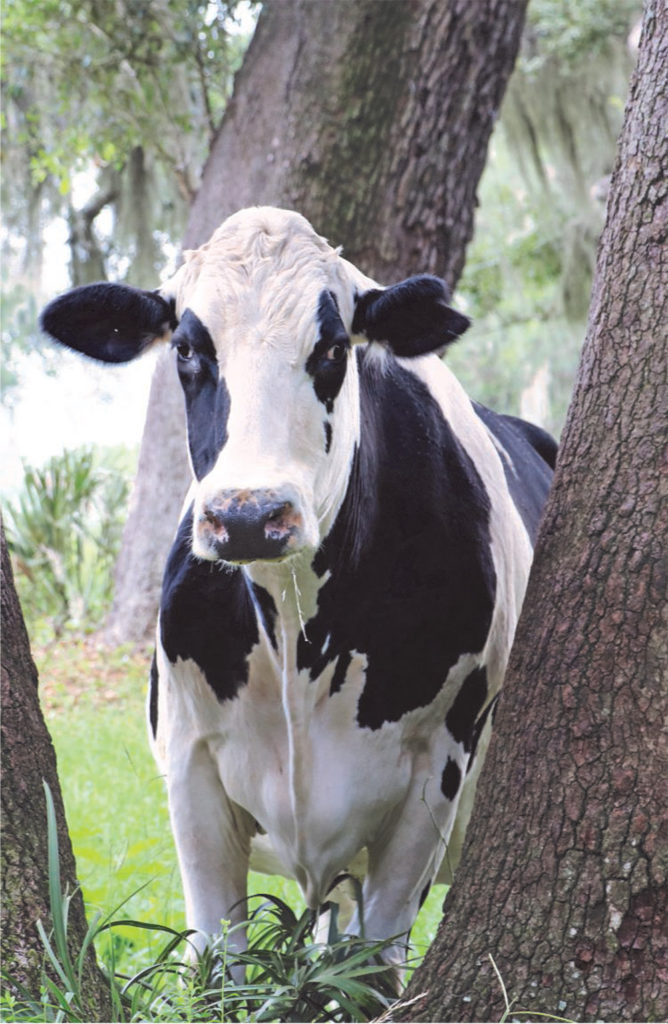
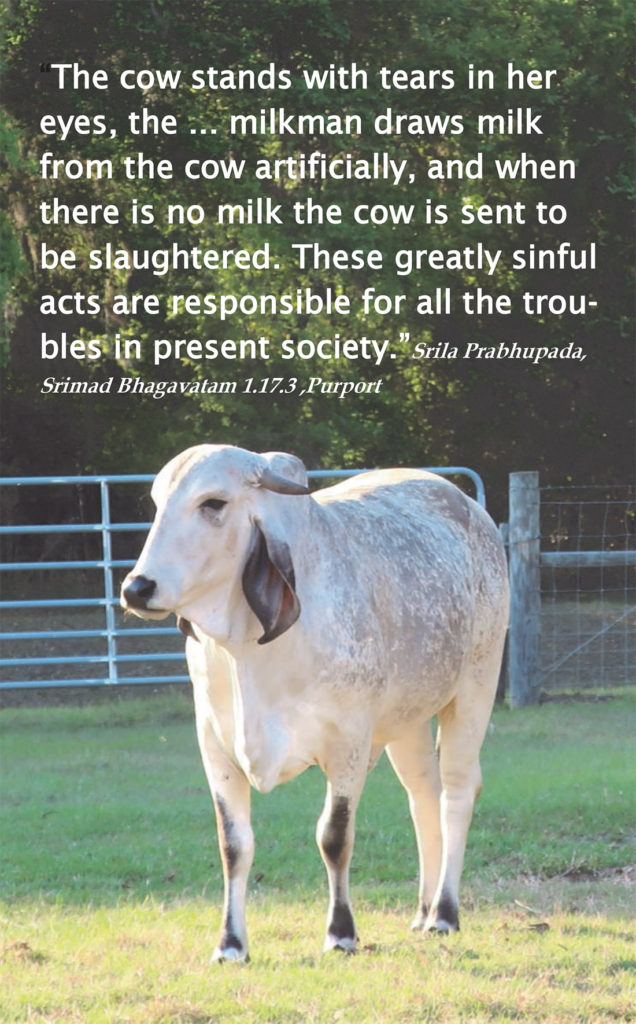

7016 SE 92 Terrace
Gainesville, FL 32641 USA
Phone: 352-792-6777
E-mail ISCOWP
Keep up with the latest news from ISCOWP. Sign up with your e-mail address to receive updates.
"*" indicates required fields
© 2023 This is the only official site of The International Society for Cow Protection, Inc. (ISCOWP) incorporated in 1990, located only in Gainesville, FL, USA. ISCOWP and The Lotus/Cow symbol are registered service marks of The International Society for Cow Protection, Inc. Website content can not be reproduced without permission.